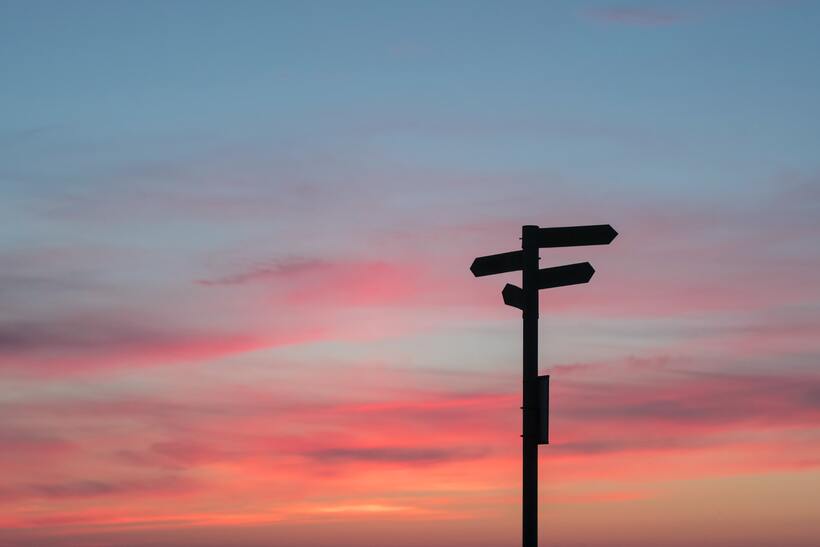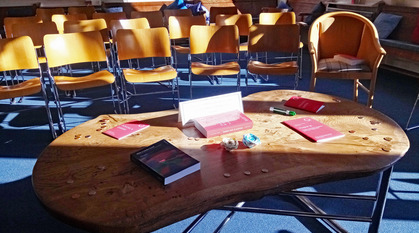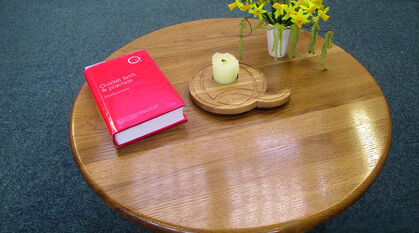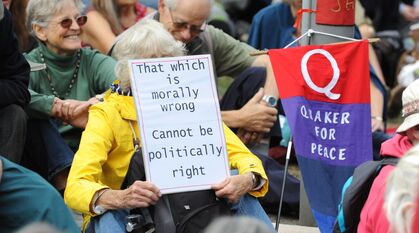Inclusion and diversity: reflecting on our journey so far
Edwina Peart challenges Quakers to unify the equality agenda, in this abridged Friends Quarterly article.

I began working for Quakers in Britain in June 2018. I was drawn to the role by an advert that asked for help, a recruitment process that included a range of staff, and the chance to work in a faith organisation I had briefly encountered before.
Having been raised in the Pentecostal Church, it seemed I had found my way back to a faith context. There was something soothing in my return to a community based on love, where inherent value is assumed; where the divisions and fault lines in the wider world, based on labels and power disparities, can be overcome because the community is strong, connection-seeking, and grounded in spirituality.
Let's start with the Quaker minute that gave rise to my role:
"We have heard the call to examine our own diversity... to look at how we can remove barriers and actively seek wider participation in the full life of our meetings, paying particular attention to race and age diversity." – From minute 38, Yearly Meeting 2017
The minute is exploratory. It validates my assumptions. It also raises questions. Why do we approach equality issues as if for the first time? Why are we reluctant to say how we've tried to bring about change before, or what we might have learnt?
It took me a while to develop a more nuanced appreciation. I gradually detected resistance; a resistance, it seemed, to certain pieces of work. For example, a survey to establish a baseline for how diverse we actually are drew hostility from some, and ambivalence and reluctance to engage from others.
"Quakers dislike labels", I was told. True, but only in relation to themselves, I found. Labels, stereotypes and prejudices abounded in explanations given for the lack of diversity and inability to effect change. These included assumptions about how Black people prefer to worship, the class divide in and across meetings, the relationship between sex and gender, and the power behind whose story is told.
What also emerged were reports, minutes and data on earlier attempts to chart diversity and build a more inclusive faith. Solutions were proposed but apparently not adopted. So, what are the barriers to change? Why, when we know what's needed, is the move to act considered too costly? What fears and hesitations underlie this inaction?
While hard to define, many of these fears can be understood in the context of our faith's history and survival. Quakers value deeply their long-nurtured community, and are committed to its continued existence. There is much to be proud of in Quaker history, such that the less-than-perfect aspects can best be understood as 'of their time' and not worth judging by the standards of today. And there's a belief that Quakers are good people and continue to do good work, and that this is better recognised than critiqued and disparaged.
All of this has merit and truth, but it is a narrow vision. What of the gifts of the Spirit, the richness that change can bring? What of sharing the treasures you have found and enjoy? In sharing, expansion occurs. The earth is abundant, love is infinite, and we all benefit from increasing our capacity to connect with others.
Justice is love in action
The world today is reeling from the pandemic, the murder of George Floyd, the climate crisis – all of which have revealed deeply ingrained injustices. It's no wonder that many of us feel tired, depleted and overwhelmed.
But, for me, this is also a special time to be alive. Special in the sense of momentous – charged with the weight of history and the need to act for change. It is harder work to ignore continuing harm, destruction and inequality than it is to acknowledge it and work to redress the balance. We either act to make things better or accept that we are part of the problem.
Our vision of a peaceful and sustainable society can only ever be a reality if it is based on justice and equality. And this means unlearning some of the things we have been taught – knowledge that supports and justifies our unequal society as it was historically formed and as it currently exists. It requires learning new things that clash with what we thought we knew – things that challenge our very idea of ourselves. This is difficult but necessary work.
I like the conversations we're now having, and the questions we're beginning to ask: can we continue to exhibit statues that celebrate those who inflicted great harm on sections of the human family? Should we ignore the parts of our history that bring to light practices and behaviour we now condemn? What are the costs of refusing to examine language that we know offends? How can we open ourselves to new ways of knowing without asking big questions and listening for the answers?
If we can't acknowledge our complicity in systems that have caused and continue to perpetuate societal harm, any action we take will be inadequate to the task of repair. It won't result in real, lasting change. The depth of discernment and action we engage in indicates where we want to be.
In 2021, at Yearly Meeting, Quakers made important new commitments and restated old ones. As a faith organisation, we are beginning to embed our worship and witness in the wider equality agenda. We are becoming clearer on where we want to be and what we are aiming for:
"We declare our commitment to becoming an actively anti-racist faith community. We are still wrestling with what this means for us. We have work to do and will return to this." – From minute 17, Yearly Meeting 2021
As well as stating a commitment, we ground this in action and recognise that difficult work remains to be done.
"With glad hearts we acknowledge and affirm the trans and gender-diverse Friends in our Quaker communities." – From minute 31, Yearly Meeting 2021
For me, this incorporates a vision where labels and differences no longer divide us. Our goal is to look at the bigger picture, recognise that of God in all of us, and embrace the power of love.
Where to now?
It's vital that we unify the equality agenda. We must build a narrative that speaks to equality and justice in its widest sense – a narrative that doesn't segment various manifestations of discrimination and injustice into discrete categories, because this tends to rank and prioritise inequalities. They are all linked.
They are all part of a system of classifying the world, of organising and producing difference, of creating hierarchy, of establishing and perpetuating a system of meaning (Hall, 2017). This is a lazy, unloving and distancing way; an unjust and untruthful way. Quakers have long challenged and refused this path. Inequalities are inherently interconnected – so too must be our response.
I look forward to continuing this journey with you.
This article is copyright of Friends Quarterly and is republished here in an abridged form with permission. Copies of the Friends Quarterly journal may be purchased via subs@thefriend.org.


